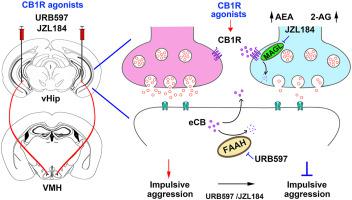Neurobiology of Stress ( IF 4.3 ) Pub Date : 2021-05-13 , DOI: 10.1016/j.ynstr.2021.100337 Chih-Hua Chang , Yu-Chen Liu , Chih-Yang Sun , Chun-Lin Su , Po-Wu Gean

|
Reactive impulsive aggression is characterized by outbursts of rage and violence when subjects encounter threatening stressful events. Although impulsive aggression and violence create a high-cost burden on health and society, relatively little is known about treatment. Early adolescent social isolation (SI) alters brain development and functions. It induces hyper-excitatory in the ventral hippocampus (vHip) to promote acute stress-provoked outbursts of aggression, referred to as impulsive aggression, in mouse models. Cannabinoid type 1 receptors (CB1Rs) act on presynaptic sites and suppress neurotransmitter release into synapses. Given that CB1R activation inhibits neurotransmitter releases and modulates excitatory network activity, we tested the hypothesis that CB1R activation reduces impulsive aggression in SI mice through decreasing excitatory activity in the vHip. Here, we report that CB1R agonists, WIN-552122 (WIN) or arachidonylcyclopropylamide (ACPA), ameliorated acute stress-provoked attack behavior in the resident-intruder test without affecting general locomotion activity. Increasing endocannabinoids (eCBs) by inhibiting degradation enzymes in the vHip reduced impulsive aggression, and the effect was blunted by administration of AM251, a CB1R antagonist. Acute stress in SI mice induced c-Fos expression, a marker of neuronal activation, on vHip neurons projecting to the ventromedial hypothalamus (VMH), a well-known brain area that controls attack behavior. eCB augmentation inhibited c-Fos expression in VMH-projecting vHip neurons surrounded by CB1Rs. These results suggest that enhancing eCB signaling in order to activate CB1Rs suppresses impulsive aggression via suppressing vHip→VMH neural activity and point to a role of CB1R activation in ameliorating impulsive aggression in adults who have had adverse experiences during early adolescence.
中文翻译:

使用内源性大麻素调节压力诱发的攻击行为
当受试者遇到威胁性压力事件时,反应性冲动攻击的特征是愤怒和暴力爆发。尽管一时冲动的侵略和暴力给健康和社会带来了沉重的负担,但对治疗的了解却很少。青少年早期社会隔离(SI)会改变大脑的发育和功能。在小鼠模型中,它在腹侧海马(vHip)中引起过度兴奋,从而促进急性应激诱发的攻击性爆发,称为冲动攻击性。大麻素1型受体(CB1Rs)作用于突触前位点并抑制神经递质释放到突触中。鉴于CB1R的激活会抑制神经递质的释放并调节兴奋性网络活动,我们测试了CB1R激活通过降低vHip中的兴奋性活动来减少SI小鼠的冲动攻击的假设。在这里,我们报告CB1R激动剂WIN-552122(WIN)或花生四烯酸环丙基酰胺(ACPA)在常驻入侵者测试中改善了急性应激诱发的攻击行为,而没有影响一般的运动活动。通过抑制vHip中的降解酶来增加内源性大麻素(eCBs)可减少冲动攻击,并且通过施用CB1R拮抗剂AM251削弱了这种作用。SI小鼠的急性应激在投射到腹侧下丘脑(VMH)的vHip神经元上诱导c-Fos表达,这是神经元激活的标志物,VMH是控制攻击行为的著名大脑区域。eCB增强抑制了被CB1R包围的投射VMH的vHip神经元中的c-Fos表达。









































 京公网安备 11010802027423号
京公网安备 11010802027423号